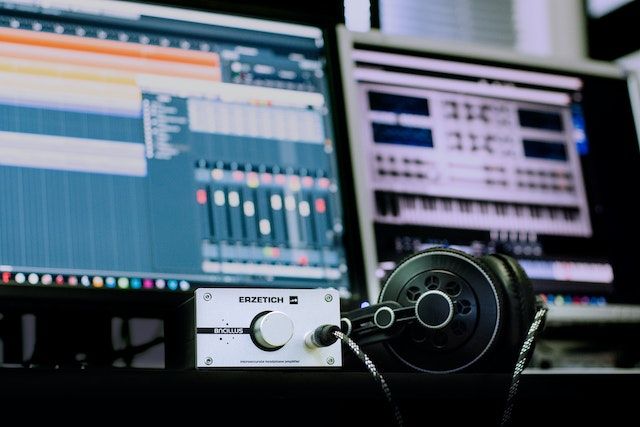Song writing process: simple steps to follow
One of the best ways to succeed in the music business is to streamline the production process, which is not always simple.
Do not forget that not everyone writes in the same style. Some musicians discover that after creating a rhythm and chord structure they enjoy, it is simpler to create lyrics and a song, for example.
This concise summary will assist you in comprehending each crucial stage of songwriting, from inspiration through recording.
Just start
While some musicians may experiment with a chord progression, a melody, and a rhythmic feel or speed, others may start with a title, a lyric, or a topic. There isn't really a right or wrong approach to this.
It all comes down to what suits you the best. Additionally, you don't have to constantly adopt the same strategy; you can experiment with various strategies for various songs and recognize that it will take you a lot of songwriting before you get a select few that are truly great.
Any creative project begins with inspiration, which is also its most difficult stage. Consider placing yourself in a private location where inspiration is more likely to strike. A song inspiration could appear to you out of nowhere, for instance, if you enjoy being in nature, by the sea, or in a large city.

Be focused on Lyrics
Unless you're writing instrumental music, your song's words may be its most crucial component. The most tedious and challenging part of composing is frequently creating the lyrics, especially for inexperienced amateur songwriters.
A smart place to begin is by having a clear understanding of the subject matter of your song. You might outline the exact message you want to convey in your lyrics before experimenting with word rhythm, structure, and cadence to match your tune. While the verses and bridge can be constructed around your main concept, the chorus needs a strong lyrical hook.
When crafting lyrics and trying to achieve a natural flow, chord progressions are very crucial too.
Write down any idea
A crucial aspect of the songwriter's skill is capturing musical snippets at the moment of inspiration.
Even if it's only a fast recording on your phone or written on a scrap of paper, it's crucial to record your idea while it's still fresh in your head. Later, when you return to continue working on the song, you'll be happy you remembered.

It's time to go buy something you can use for mobile recording if you don't already have one, something portable you can bring wherever you go. A contemporary smart phone makes a great recording tool for both written lyrics and audio recordings.
What you experienced matters
As obvious as it may seem, some of history's greatest songs are autobiographical, with the writers finding inspiration in real-life occurrences and traumas.
You can use your life experiences to great effect whether you've had good or bad events. Make a song of your sentiments by expressing those emotions.
Pay attention to trends
The ability to listen to and evaluate songs in the same musical genre that you are writing comes in handy for understanding your own songwriting patterns. You may achieve this by merely observing the tendencies of particular songwriters.
The next time you listen to one of your favorite musicians, play 5–10 of their songs and try to pick out certain elements, like the ones below, to look for any trends.
- Which chords do they utilise?
- What musical styles?
- Does the tempo or key of this song ever change?
- What rhythms exist?
- The lyrics, how about them?

What a song is composed of
A title/ song topic
Choose a title or decide on your song topic. Beginning with words, a title idea, or an idea for the subject matter of the song can help you shape the other components of the song into a more appealing and well-rounded piece.
A structure
The typical structure of a song is an introduction, a verse, and a chorus. You might also think about composing a bridge or including a pre-chorus or refrain.
A pre-chorus is a passage that comes before the chorus, whereas a refrain is a brief lyrical line that incorporates the song's title. Songs may also have an instrumental interlude or passage that follows the chorus, for instance.
An Intro
Do you want an introduction? Or perhaps there should be no introductions at all? Keep your introduction brief and straightforward in case you go for it, and remember that radio songs have brief introductions.
A hook/ chorus
Popular songs nearly always contain a section that stays in the listener's memory. This is known as the “hook” in songwriting. Sometimes the chorus or a vocal refrain contains the hook. Another option for the hook is a brief musical interlude.
The verses
Pay attention to how the words sound and how they complement the melody. This is what songwriters refer to as prosody, and it is a crucial component of songwriting that deserves careful attention.
Lyrics
The foundation of a song is typically its lyrics. Either the music or the lyrics could be written first. If you are writing both, you can either work on each separately or compose them simultaneously with the music.
Your aim is to discover the ideal mixture that somehow represents what the song is about, creates the appropriate mood, and drives and inspires you (and your audience) to want to listen.
The bridge (optional)
The bridge, also known as the channel or the release, is an optional section that contrasts with the preceding sections and offers some relief from their repetition. It might modulate to a different key as a complete surprise, or it might just be a small tweak to what has gone on before.
Collaborate with other artists
Everyone has writer's block at some point, so working with other musicians can be a wonderful approach to break new ground and gain new insight into your tune.
Show them what you have so far, talk about any fresh ideas they may have, and then see what comes of it. A fellow musician's outside perspective on your track can help you make your music sound its finest. Two minds are almost always preferable to one.

Record
Practice your song until you can sing it off the top of your head. You no longer need a full studio to record your music thanks to cellphones, PCs, and cutting-edge apps and software.
To save time and money, polish your song before the recording session if you have access to a full studio and audio engineers. Keep in mind that it takes time to create any excellent track.

Conclusion
Making decisions is not the only purpose of using a songwriting process. It's there to support you in making wise choices. By using the above-described information, you can start working with its essential components and get some ideas about how to modify it so that it perfectly suits you as the songwriter.
Practice a lot, look for criticism, and show the world what you can do. Once you have some high-quality recordings, have an internet presence for it and think about posting it on CalypsoRoom so you can listen to it with friends while connected by webcam, getting as much feedback as you can.
We hope you enjoyed reading this post, and if you'd want more advice for advancing your musical career, please visit our blog area. There, you'll find a lot more helpful articles, tips, and suggestions.
Are you a music artist or label and do you want to give your music a further dimension? Do you own or co-own the master and publishing rights to your music? Consider posting it on CalypsoRoom listening to it together with your super fans, friends or strangers at the same time, connected by webcams.
Thanks for reading,
CalypsoRoom Team
back
Written by CalypsoRoom Editorial Team
The CalypsoRoom Editorial Team is a skilled and diverse group of writers, researchers, and industry specialists who have access to Calypso's data and information in order to give you broad knowledge about the music industry as well as helpful advice to help you manage your music and dancing career.
Updated January 2023
Company number: 681223
James's Walk 31, Dublin, Ireland
contact@calypsoroom.com
+353 (89) 435 8928



